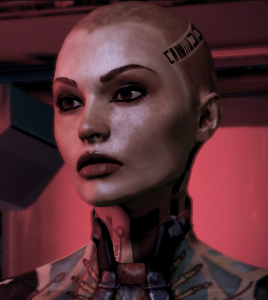Anyone who has played a BioWare RPG could probably attest to the fact that as far as game developers go, BioWare is fairly progressive and diverse. While the industry tends to pander to white, 18-25 year old males, essentially assuming them to be the only demographic, BioWare offers same-sex romances, female leads, and prominent roles for people of color. And not only that, but they’re well-written! They’re complex! Their stories provide us with messages about our own lives and society, which is what all great games should do.
I say all this so I can talk about Mass Effect, Mass Effect 2, a few of the game’s female characters, and what their stories say about women and society, and how they make me feeeel.

Tali’Zorah nar Rayya
Let’s start with a fan favorite, Tali’Zorah nar Rayya vas Normandy. In a game full of unfamiliar faces and social structures, Tali still manages to register as an Other. She’s a woman, an alien (of a race that has been generally ostracized and shunned by Citadel space, no less), and she lives her life in a kind of envirosuit that keeps her weak immune system safe. It wouldn’t be a stretch to suggest that her design is reminiscent of a Muslim woman in her hijab, which perhaps further influences my headcanon of Tali as a woman of color.
Tali is smart – a mechanical genius smart; she’s proud of her culture and likable; and after she becomes available as a love interest in Mass Effect 2, she maintains a kind of bodily autonomy unmatched by many other characters. While the autonomy can mainly be attributed to her suit, it is still important to note that in a popular video game series there exists a prominent female Other character who is portrayed as desirable yet still in full control of her body and sexuality. While it’s true the game tends to paint Tali as somewhat naive and unassuming, and her suit could easily be interpreted as a full-body hymen, the fact that she chooses to let Shepard in without any later regret, while also taking care to put her emotional and physical health first, makes me feel all fuzzy and feminist inside.
Tali’s LI storyline makes it clear that just because a woman is covered from head to toe doesn’t mean she lacks a sexual identity, and that just because she has a sexual identity doesn’t mean that it’s for everyone to see and consume. While there are still certain problematic aspects to her character that I could spend days analyzing, Tali is a lesson in consent and sexual autonomy and I’m content to relish this small victory for at least a few minutes.

Jack (Subject Zero)
Another character who plays by her own rules with regard to her body is Jack, aka Subject Zero. I like to think women gamers everywhere stood up and cheered when Jack was introduced in trailers and promos for ME2, because she was just so refreshing. Because the default gaze in visual media tends to be male (especially true in film, see Laura Mulvey’s Visual Pleasure and Narrative Cinema for more reading on this topic) female characters with villainous natures tend to be written more for the sake of decoration and titillation, rather than actual subversion of the concept of femininity and gender roles. In the case of Jack, her character resists being objectified every step of the way. With her shaved head, tattoo-covered torso, minimal utilitarian clothing, and devastating biotic ability, Jack is bad, and I like her that way. Her role as a love interest in ME2 shows that femininity is fluid, complex, and cannot be universally defined. Of course, it doesn’t hurt that she’s white; this type of characterization is much less common for women of color, who are more likely to be portrayed as having the rough exterior without the sensitive, “human” reveal.
Jack is also a survivor, a victim of abuse at the hands of many. All her life she has been hunted, experimented on, and physically and psychologically tormented by the terrorist group Cerberus for her extreme biotic abilities. More so, she has been raped, abducted, and even sold into slavery. While the trope of women being motivated towards revenge by assault (particularly sexual assault) is legendary and tired, Jack manages to be more than just a victim out to get her attackers. She’s a multi-dimensional character who carries a lot of rage, but also has the capacity for healing and love. It’s slightly upsetting that most of this healing comes through the romance option for Jack (to say that Shepard has something of a Messiah complex would be the understatement of the year) but like Tali, the shortcomings of Jack’s character are eclipsed for me by her successes. I can forgive a woman like Jack being cured with “just a little tenderness,” as if in a summer romcom, for the sake of a woman like Jack being a major character in a video game in the first place. Are you noticing a theme here: it’s not perfect, but it’s a start? Welcome to the world of the female geek!

Miranda
Finally, I want to talk about Miranda Lawson. While I’ve personally never been an overt fan because of her strong Cerberus ties, I find her character fascinating and an interesting step forward for the concept of “eye candy” female characters. Miranda was genetically engineered by her megalomaniacal father to be perfect in every way, including physical attractiveness. She was made to be eye candy, as well as super-intelligent and skilled. Miranda provides the rare point of view of a character generally relegated to serve as mere T&A. Though she is visually objectified, she is written as a person: back story, feelings, opinions and all! Her loyalty to Cerberus has meaning for her, which we are allowed to see and consider as we shape our opinion of her, a luxury not many sexy bad guy assistants are provided.
The main failing I find with Miranda’s character development is the continued visual objectification, despite the constant reassurances that she’s more than that, as well as the sense that her image issues are dismissed with a single Shepard Pep Talk™. When a narrative tells us, “You are more than the sum of your parts,” and combines it with an image of a painstakingly animated ass in a skintight jumpsuit, the message gets a little lost. As I’m sure any woman can tell you, body image issues (especially ones that are inextricably tied to your very existence) are incredibly difficult to overcome, often remaining a struggle during your entire life. But then again, Shepard is basically Space Messiah, so I suppose one reassuring “Be proud of yourself” pep-talk translates to years of therapy and soul-searching?
Strong, diverse writing is the key to more inclusive characterization in video games and I think BioWare is one of the few developers that recognizes this and prioritizes it. But everyone makes mistakes, and sometimes the main plot or the development of the main character takes precedence. It’s also difficult, even if you have a diverse writing team, to step back from the social norms with which we are raised. The female romantic options in Mass Effect are notably docile and submissive: even Jack must be “tamed” before she is deemed acceptable to love (I was hopeful that we might see a role reversal with the asari justicar Samara, because she would certainly be the dominant party in a sexual relationship, but alas, it was not to be.) The only way around these mistakes and this type of characterization is to review games with a progressive eye. It’s a common misconception that this kind of treatment “ruins” the experience. “Where will it stop? What’s with this PC nonsense?” some gamers may cry. I argue that the more perspectives we draw from, the more cultures we include, the better our stories will become. The experiences of the Other are just as ripe for creative expression, and because those stories have never been told before, they offer the exciting opportunity to step outside our experiences of truth. The more we include these diverse perspectives and worlds, the more opportunities we have to entertain and teach about the world we live in; which, again, is what all great games should do.
(All images sourced from the Mass Effect Wiki)


Why I didn’t pursue the romantic subplots of ME2:
– Ashley Williams. I ended up with Ashley in ME1 romance subplot, because she’s just my kind of woman. Strong, smart, can provide cover fire and quote Tennyson. What’s not to love.
– I’m seeing Tali as a tomboy little sister. Sure, I like her, but not romantically. And the whole thing with getting unpacked from her envirosuit just to get laid with Shepard seems kinda stupid: too much risk for too little gain.
– Jack is broken. She’s so messed up that any relationship would break her even more, no matter how it’d end. And with her temper, it’d be a disaster.
– …and Miranda is a slut.
Well Mike, you’ve certainly given me a lot to work with in just one comment, so let’s get down to it, shall we?
First of all, we should lay down some ground terms. Number one: slut shaming, which is what you’re doing to our friend Miranda. Urban Dictionary defines the term as “an unfortunate phenomenon in which people degrade or mock a woman because she enjoys having sex, has sex a lot, or may even just be rumored to participate in sexual activity.”
Even if I thought it was ok to call a woman a slut in a disparaging way, I’m not sure why Miranda deserves this scorn, because she isn’t even the one who initiates the sexual relationship between herself and Shepard. Shepard asks why he can’t admire her body and her mind, and after a little conversation, she replies that perhaps she wouldn’t mind that. (Ladies, prepare your pearls for clutching.) Once it becomes clear that the two are involved in a romantic relationship, sure, she gets more flirtatious and when the sex scene comes up, she’s even a little vampy. But… why not? Don’t we all act this way when we like someone, when we’re pursuing a sexual relationship with someone? Just because Miranda isn’t shamed by the thought of sex with a smart, strong, exciting, attractive man doesn’t make her a slut. And actually, nothing can really make a woman a slut, because the term itself is a value judgment whose definition varies from person to person.
Second term: mentalism (a form of ableism), which is what you’re doing to our friend Jack, whether or not you realize it. This one even has a Wikipedia page, which defines it as “a form of discrimination and oppression against people based on categorization of mental type, mental action, supposed intelligence, or neurology, especially against those diagnosed with a mental disorder or a mental illness.” Calling a person “broken” and implying they are incapable or undeserving of love because they have endured terrible things and will possibly suffer long-term mental harm is just not okay. While it’s true that folks with mental illness or tormented pasts may have to work harder at relationships than others because of the way their brain chemicals work (essentially an outside force which they have no control over and are not to blame for, by the way), they are no less deserving of a chance to try.
Finally, a last term: consent, which I talked about a little in the article, but didn’t really explain in a broader context. The dictionary definition of consent is pretty simple, “to give assent or approval : agree, to be in concord in opinion or sentiment,” but in the real world, especially with regards to sexuality, “consent” typically means clear communication of desires and needs. Now, imagine that Tali’s suit isn’t necessary for her survival, but is, for example, a gimp suit. Imagine that she is the submissive party in a consensual dom/sub relationship. Is it still “kinda stupid” to consider her limits? Her safe word? Her turn-ons as well as her fears? Because by spending the time to “unpack” Tali, her suit, and what it means for her health and safety, ME2 teaches us that it’s not stupid, and that is so important. Consent and communication matter. Full stop.
Re: Ashley Williams? Whatever floats your boat, man. That’s all I got.
Anyway, good talk, Mike.
So, first:
Miranda. When I get a genetically engineered beauty literally bundled in with everything I need to do my job, and all of it courtesy of a known terrorist organization, something’s fishy here. That and I got a vibe of “I have to control you, Shepard.” from Miranda. I know a couple of girls who enjoy sex and I wouldn’t call them sluts, I heard that joke way too many times. With Miranda, it’s something else – it’s that drive to gain and keep control, and that’s something I can’t accept. I’d say I’m a’Freud of her (that’s not the same thing as “afraid”). Then there’s her loyalty mission – I got a feeling that she cared more about humiliating daddy dearest than about her sister. And I really, REALLY don’t like arrogant people like her.
As for Jack: you want a mentalist, try Patrick Jane. I never said she is “incapable or undeserving of love” – I’m not going to insult MYSELF with this sort of statement (long story). Jack’s the person that is going to rage when something she always wanted goes wrong – been there, done that. Also, she’s just been sprung from a prison ship run by a corrupt warden, the one thing she wants more than anything is literally sending her past up in smoke and it turns out that she’s apparently surrounded by people working for the organization that ruined her life – trying to romance with her at this stage just feels WRONG. And blunt sexual advances are even worse. Look at it this way: when you’re convinced that everyone is an enemy, and suddenly someone wants you to trust him, you don’t, because he most probably wants to use you for his own ends. The more he wants you to trust him, the more you resist. See where I’m going with that? Adjusting takes time. You don’t suddenly fast-track to romance, and especially not in those circumstances.
Now, Tali in a gimp suit. Nice job giving me another reason NOT to romance Tali. I mean, I saw her as a teenage girl, and now you go with a “teenage girl with a gimp suit and wilder sexual fantasies than I ever had”. I, as in Mike, just call me Mike, and let’s keep it that way.
First: disappointment. Tali, be it an envirosuit or a gimp suit variant, is going, in the end, to have sex with an alien. And while she surely is not afraid of the unknown, there’s still that thought it all may turn out to be… well, not what she wanted. All that build-up, all those feelings, and then both Tali and Shepard get disappointed – her, because Terrans aren’t what she imagined them to be, and him, because he tried and couldn’t satisfy her.
Second, risk. Gimp suit Tali risks only disappointment and some heartache. With envirosuit Tali, the matter is much more serious, namely – health hazard. Risking life over something that might turn out to be not exactly what she wanted is not what I would “consent” to.
As for communication, saying “no, Tali, I understand, but I cannot let you catch a potentially fatal flu only because you want some alien nookie” is good enough, right? Priorities.
Bottom line: it’s a male point of view. Women look at relationships differently, men look differently. Different methods, different priorities.
Elyse is the wind beneath my wings. Just sayin’.
All of you are.